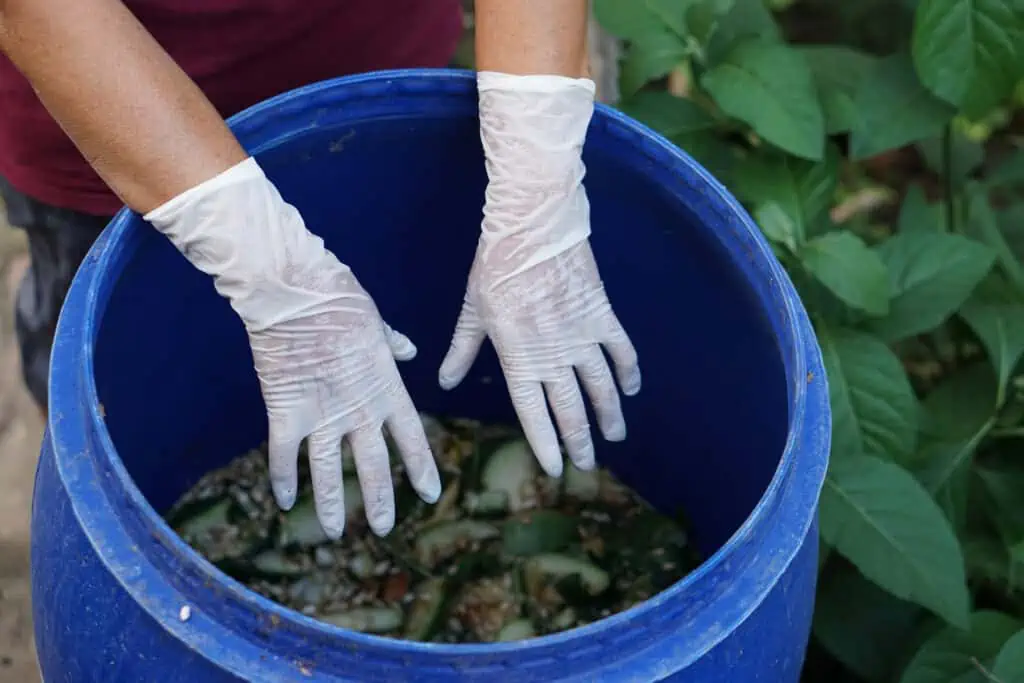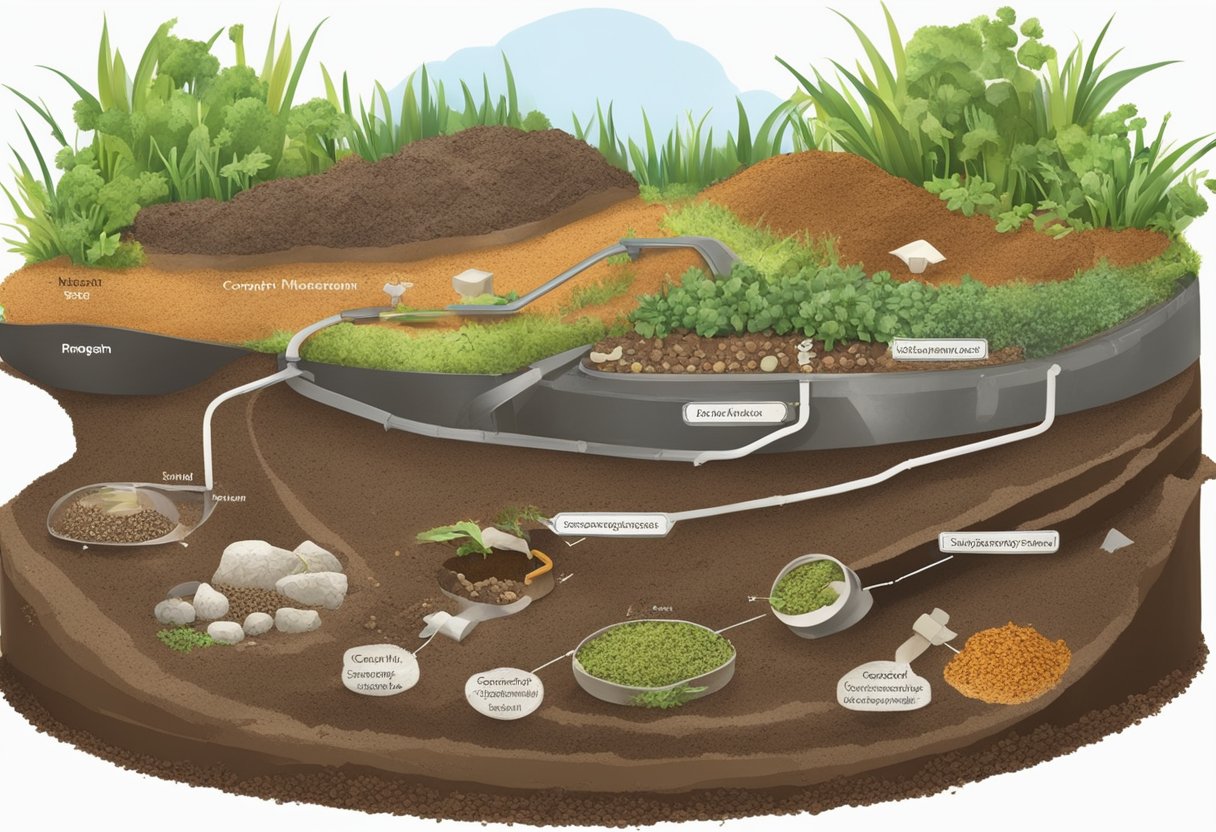As an Amazon Associate I earn from qualifying purchases.
At A Glance
Compost enzymes are biological catalysts that accelerate the breakdown of organic materials in a compost pile. They are produced by microorganisms such as bacteria and fungi during the composting process. These enzymes target specific substances like cellulose, proteins, and fats, breaking them down into simpler compounds which can be further decomposed by microorganisms. Adding products with compost enzymes or enzyme-producing microbes can help speed up the composting process, ensuring a quicker and more efficient decomposition. Moreover, compost enzymes can help in reducing odors, controlling pathogens, and producing a more uniform compost.
Composting is a natural process that recycles organic waste into nutrient-rich soil. It is an environmentally friendly way of reducing waste and improving soil health. However, not all waste is compostable, and some compostable materials take a long time to break down. This is where compost enzymes come in.

Compost enzymes are naturally occurring proteins that accelerate the composting process. They break down organic matter into simpler compounds that can be easily absorbed by plants. Enzymes are essential for the decomposition of complex organic molecules such as cellulose, lignin, and proteins. Without enzymes, composting would be a slow and inefficient process.
Recent research has shown that compost enzymes can also play a role in breaking down plastic waste. Scientists have discovered enzymes that can degrade certain types of plastic, making them more compostable. This breakthrough could lead to a reduction in plastic pollution and an increase in the amount of compostable materials. Compost enzymes could be the key to a more sustainable future.
Role of Microorganisms in Composting

Composting is a natural process that involves the breakdown of organic matter into a nutrient-rich soil amendment. Microorganisms play a vital role in this process by breaking down complex organic compounds into simpler compounds that can be easily absorbed by plants. The process of composting involves a series of biochemical reactions that are catalyzed by various enzymes produced by microorganisms.
Types of Microorganisms
The microorganisms involved in composting can be broadly classified into three categories: bacteria, fungi, and actinomycetes. Bacteria are the most abundant microorganisms in compost and are responsible for the initial breakdown of organic matter. Fungi and actinomycetes are also important in the composting process and are responsible for breaking down more complex organic compounds such as lignin and cellulose.
Microbial Activity
Microbes in compost play a central role in the composting process, and the ecological changes are also time-series, with the total number of microorganisms showing a trend of rising, then falling, and then rising again. The composting process involves a series of biochemical reactions that are catalyzed by various enzymes produced by microorganisms. These enzymes enable them to chemically break down tough debris such as woody stems, bark, or newspaper.
Pathogens and Composting
While microorganisms are essential for the composting process, certain pathogens such as Salmonella and E. coli can also thrive in compost piles. Therefore, it is important to maintain proper composting conditions to ensure that the compost reaches temperatures high enough to kill any potential pathogens. This can be achieved by using compost starters, compost activators, or compost accelerators, which are pre-cultured seed inoculums that help to increase microbial activity and enzymatic activity in the compost pile. Granular compost starter can also be used to inoculate the compost pile with beneficial microbes that help to speed up the composting process.
Composting and the Environment
Composting is a natural process that converts organic waste into nutrient-rich soil. This process is not only beneficial for plant growth but also has a positive impact on the environment. In this section, I will discuss how composting compares to landfills and how it affects climate change.
Composting Vs Landfills
When organic waste is sent to landfills, it decomposes and releases methane gas, a potent greenhouse gas that contributes to global climate change. Methane is 25 times more potent than carbon dioxide, another greenhouse gas that is released during the decomposition process. Landfills are responsible for approximately 20% of methane emissions in the United States.
Composting, on the other hand, reduces methane emissions by diverting organic waste from landfills. Instead of decomposing in landfills, organic waste is broken down in a controlled environment, where oxygen is present. This aerobic decomposition process produces carbon dioxide, which has a lower global warming potential than methane.
Composting and Climate Change
Composting has many benefits for the environment, including reducing greenhouse gas emissions that contribute to climate change. By diverting organic waste from landfills, composting reduces the volume of waste that decomposes and releases methane gas. According to the EPA, composting can reduce greenhouse gas emissions by 2.3 metric tons of carbon dioxide equivalent per ton of waste.
In addition to reducing greenhouse gas emissions, composting also improves soil health and reduces the need for chemical fertilizers. Compost is a nutrient-rich soil amendment that helps retain water and nutrients, improving plant growth and reducing the need for irrigation. Compost also helps reduce erosion and runoff, which can pollute waterways.
In conclusion, composting is a natural process that has many benefits for the environment. By diverting organic waste from landfills, composting reduces greenhouse gas emissions and improves soil health. Composting is a simple and effective way to reduce our impact on the planet and create a more sustainable future.
Practical Aspects of Composting
Maintaining the Compost Pile
As a compost pile matures, it requires regular maintenance to ensure that it remains healthy and effective. The pH level of the compost pile should be monitored regularly, and if it falls outside of the ideal range of 6.0 to 8.0, lime can be added to adjust it. Bulking agents such as straw or wood chips can be added to improve air circulation and maintain the correct moisture level. The compost pile should be turned periodically to ensure that all of the organic matter is properly decomposed. In addition, the compost pile should be protected from heavy rain, which can cause the pile to become too wet and slow down the composting process.
Composting Challenges
Composting can be a challenging process, particularly for those who are new to it. One of the biggest challenges is maintaining the correct balance of materials in the compost pile. The initial C/N ratio of the compost pile should be around 25:1, which can be achieved by mixing together a variety of organic materials such as leaves, grass clippings, and kitchen scraps. The compost pile should also be kept moist but not too wet, and it should be turned regularly to ensure proper aeration. Weather conditions can also affect the composting process, with hot and dry weather causing the pile to dry out too quickly, while cold and wet weather can slow down the decomposition process.
Composting Results
The results of composting can be seen in the compost pile itself, as well as in the plants that are grown using the compost. As the compost matures, it will become darker and more crumbly, with a pleasant earthy smell. The NPK level of the compost will also increase, making it a valuable fertilizer for plants. Compost can be used as a bio-fertilizer, and it can be applied to the soil either before planting or as a top dressing during the growing season. The crystal structure of the compost will also improve, making it easier for plant roots to penetrate the soil and absorb nutrients.
In order to achieve the best results from composting, it is important to pay attention to the enzymatic activity during composting. Enzymes play a crucial role in breaking down organic matter and turning it into compost. In addition, inoculants and catalysts can be added to the compost pile to speed up the composting process. Worms can also be added to the compost pile to help break down the organic matter and improve aeration. Engineering techniques can also be used to create hot composts or manure compost, which can speed up the composting process even further. By paying attention to these practical aspects of composting, it is possible to create high-quality compost that can be used to grow healthy, vibrant plants such as tomatoes.
Conclusion
In conclusion, composting is a natural process that can be enhanced by the use of compost enzymes. Composting is a useful method of waste management that can help reduce the amount of waste that ends up in landfills. Compost enzymes can help speed up the composting process by breaking down organic matter into simpler forms that can be used by plants.
The use of compost enzymes has been shown to improve the quality of compost by increasing the nutrient content and reducing the amount of time required for the composting process. Enzymes such as β-D-glucosidase, acid phosphatase, arylsulphatase, lipase, chitinase, and cellobiohydrolase have been found to be effective in enhancing the composting process.
It is important to note that the effectiveness of compost enzymes may vary depending on the type of waste being composted, the environmental conditions, and the type of enzyme used. Therefore, it is important to choose the right enzyme for the specific composting process.
Overall, the use of compost enzymes can be an effective way to improve the composting process and produce high-quality compost. However, it is important to use them responsibly and in accordance with recommended guidelines to ensure that the composting process is safe and effective.
